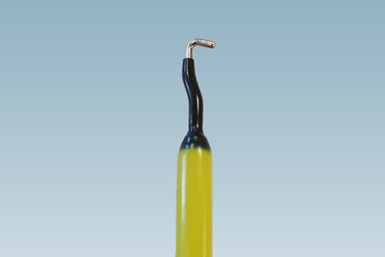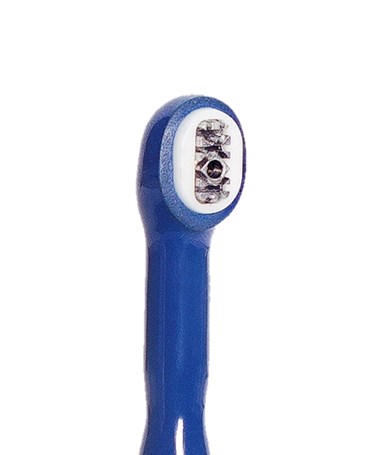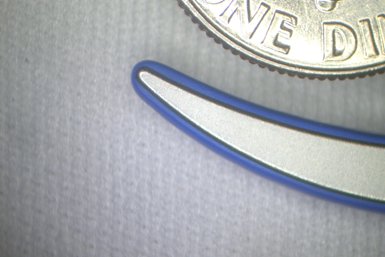
Monopolar device with a seamless black and yellow ethylene and tetrafluoroethylene (ETFE) coating and Virtual Masking on the electrode. All images courtesy of Surgical Coatings
Sometimes a name says it all. Surgical Coatings LLC (Sedalia, Colo.) specializes in coatings for surgical instruments and was recognized by Products Finishing as a Top Shop in 2020. The company’s president and CEO James Morris has spent his life learning about coatings and automation technology. As early as the age of 8, he could be found in his father’s shop learning the trade. His father Jim had more than 20 years of experience in the medical device industry when he founded Integrated Surgical Sciences Corp. (ISSC) in 1995 and Morris effectively grew up learning about the medical device coating industry from one of its pioneers. When his father passed away in 2011, he set his sights on carrying on the work. After graduating from the Mechanical Engineering program at the Colorado School of Mines, Morris joined ISSC to run operations. With the help of his friend and mentor, Jonathan Thorne, a seasoned medical device industry veteran that he met during his time at Mines, Morris fully acquired the company from his father’s estate in 2019 and aptly renamed it Surgical Coatings.

Triglycidyl isocyanurate (TGIC) polyester powder coated ablator device showing Virtual Masking on a ceramic insulator and electrode.
Trends in the medical industry
Surgical Coatings works on a wide variety of coatings for medical devices. Morris says current trends in the industry are for increased abrasion resistance and improved insulative properties for electrosurgery. As the technology behind electrosurgical instruments advances, increasing amounts of energy are being used to enable them.
“Most of the projects we’re currently seeing a higher demand for are single-use devices that are ultimately used in robotic surgery systems,” says Morris. “There’s usually a voltage requirement or an energy requirement, so you’ve got to have a certain dielectric strength.”
For example, the company selected Solvay’s (Alpharetta, Ga., U.S.) KetaSpire polyetheretherketone (PEEK) powders to powder coat metal tubes used in electrosurgery, protecting surgeons and patients from electrical currents. KetaSpire PEEK material was selected for its chemical and fatigue resistance while maintaining its mechanical properties and dimensional stability at high temperatures.
In addition to being able to insulate for electrosurgery, surgical instruments need to stand up to the wear and tear they can be subjected to during surgery. “The term that’s often used in the industry is ‘sword fighting,’” says Morris. “When you’ve got multiple instruments inside of somebody under robotic control, if anything does go wrong, and they start banging parts together or a surgeon is using one shaft to clean off the cutting edge of another, they need a coating that’s going to withstand the abrasion of another instrument next to it and still hold its insulative properties.”
Automation
Coating electrosurgical instruments is exacting work. The tolerances on such products are tight and consistent quality is crucial. One of the things that makes Surgical Coatings a leader in this area is its focus on automation.
“We’re probably 20 years early for the automation party,” says Morris. “There is nobody handing manual guns in our shop.”
The company has developed its own PID control software and Morris says data is collected and fed through the software to adjust variables. For example, the powder coating line automatically sorts parts that are measuring high or low for coating thickness and feeds data back through to adjust powder coating gun variables, such as supplemental air or charge on the material. Laser micrometers and other measuring devices are used to collect data, which is tracked by proprietary software. This statistical process control (SPC) data is delivered to customers.
The company also employs a process it calls Virtual Masking, which Morris says is one of the company’s biggest differentiators. In this process, Surgical Coatings coats the entire substrate and then uses automated laser ablation systems to remove the coating in specific areas.
“We’ve essentially figured out how to just remove the coating and leave the substrate as untouched,” says Morris. “And that gives us an incredibly clean, crisp mask line — very accurate with no flakes, irregularities or anything that might be left behind in a patient.”

Precision Virtual Masking on a liquid coated acrylic polyurethane vessel sealing device. The sealing surface and radii of the jaw are all controlled in the Virtual Masking process.
A specialized understanding of optics allows the company to adhere to tight tolerances. “A lot of our systems can be controlled to lower tolerances, but right out of the box we’re holding plus or minus two-tenths of a thousandth of an inch,” says Morris.
With its Virtual Masking, the company can put chamfers on the edges of the masking lines so that it can not only control the coating-free areas very exactly but also allow for a transition in the mask line so it won’t tear a seal as it slides through a cannula during surgery.
In the medical device field, tight tolerances are the name of the game. Morris says that Surgical Coatings is able to control run-of-the-mill TGIC (triglycidyl isocyanurate) polyester powder coatings to less than plus or minus 1,000th an inch in coating thickness as the line is moving. The company is able to move the parts through the line at about 1,000 parts per hour, maintaining that tolerance.
At the end of the day, the automation contributes to what really defines Surgical Coatings, and that is close attention to quality control. Morris has a way of putting it all in context. “We ask ourselves: Would you take this coated component and use it on your own mother, father, son or daughter in a life-saving surgery?” he says. “If it doesn’t pass that test, it’s not high enough quality to leave our facility.”
Related Content
Steelhead Technologies Wins Top Performer Award
Steelhead Technologies has receved the Winter 2024 Top Performer award in job shop software from software comparison website SourceForge.
Read MoreAI Tool Optimizes, Automates Powder Coating
New “digital Blueprint” technology fine-tunes every aspect of a powder coating system. The platform promises at least 10% powder savings, a return on investment of a few days and an increase in uptime.
Read MorePowder Coating Automation Can Reach ESG Goals for Automotive Parts
By adopting the robotic process automation (RPA) powder applicator, a plant can make significant savings for both the environment and the bottom line.
Read MoreAkzoNobel Uses VR for Training Airline Apprentices
The virtual reality technology provides a paint booth and spray gun that enables trainees to work and master their skills without losing parts in the process.
Read MoreRead Next
Reshoring of Medical Equipment With an Eye on Electropolishing
Hubbard-Hall prepares to help surface finishers seeking to implement electropolishing processes in order to take advantage of reshoring efforts to bring production work back to the U.S.
Read MoreElectropolishing in the Era of COVID
Custom Fab Solutions vice president Larry Vortherms discusses electropolishing, how COVID is impacting parts cleaning and his advice for weathering the pandemic.
Read MoreEcoat Enables Chest X-Ray System
A diverse customer base is key for small shops like Giering Metal Finishing, especially during the COVID-19 pandemic. The company says one of its largest growth areas has been with a customer manufacturing chest x-ray systems.
Read More













.jpg;maxWidth=300;quality=90)









